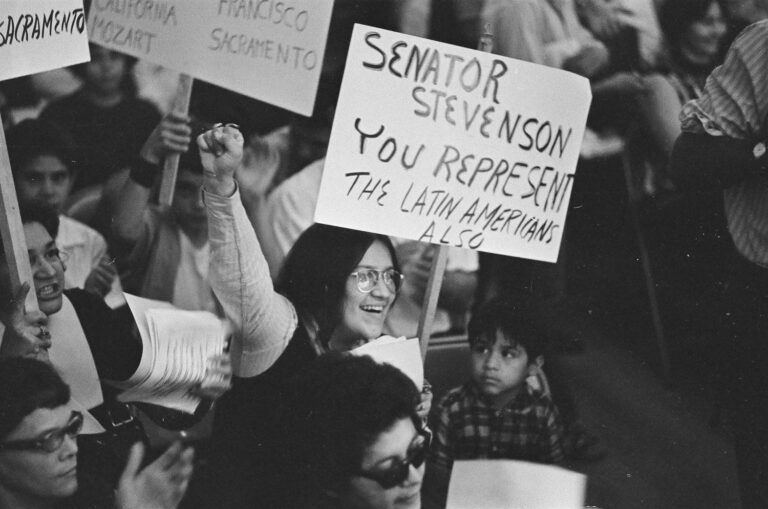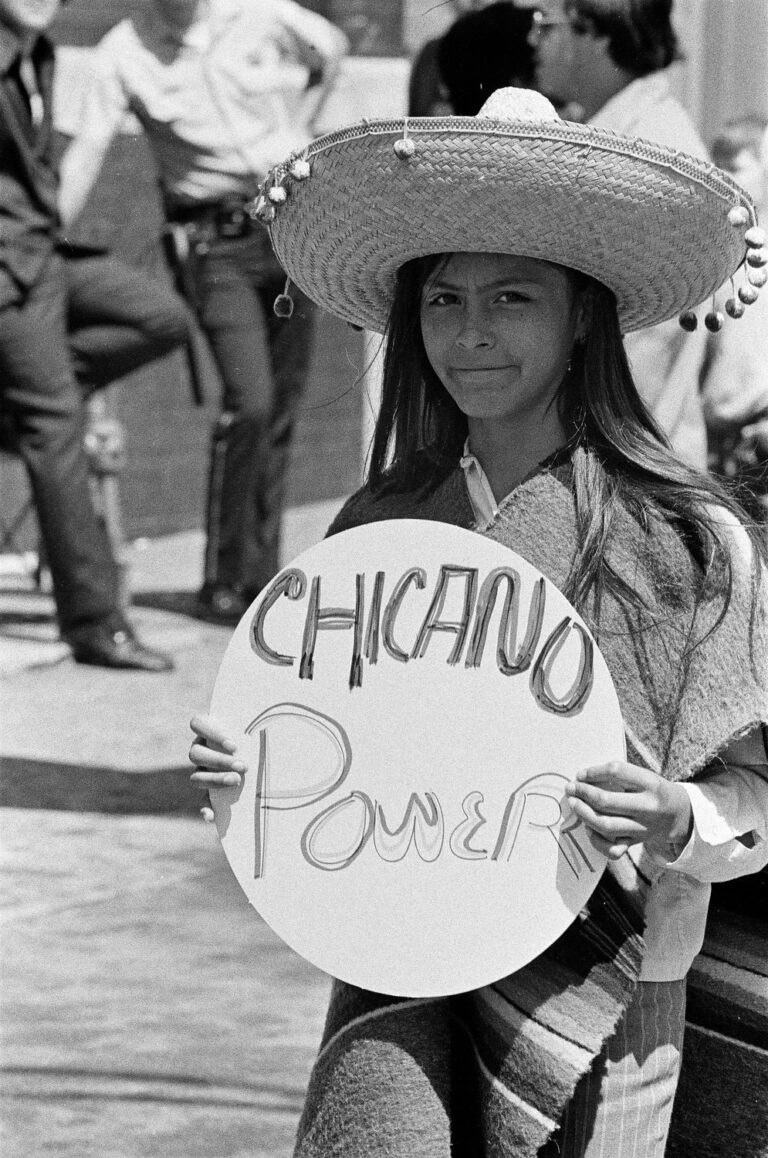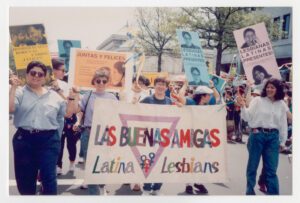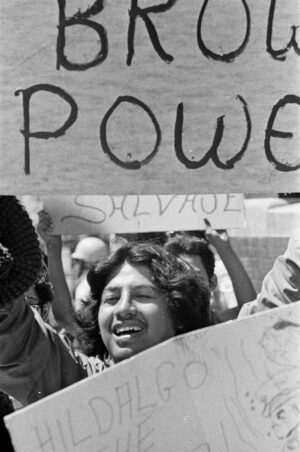CHM curator of civic engagement and social justice Elena Gonzales writes about the history and definitions of various descriptors of people of Latin American heritage and explains why CHM is shifting from using “Latino/a/x” to using “Latine.”

A woman holds up a sign that reads “Senator Stevenson, you represent the Latin Americans also,” Chicago, July 19, 1971. ST-60004929-0350, Chicago Sun-Times collection, CHM
Latinx, Latine, Latino, Latin@, Latin, Brown, Chicano, Hispanic. Over the years, people of Latin American heritage have described themselves in a lot of different ways, and others have described them still differently.

A girl holds up a sign that reads “Chicano Power,” Chicago, July 19, 1971. ST-60004929-0031, Chicago Sun-Times collection, CHM
It can be confusing for everyone and difficult to stay up to date and feel like you’re using the “right” terminology. The fact is that there’s no definitive “right” answer but there are important considerations to make when deciding what word to use.
Most Latinos define themselves in other ways first:
- By a country (or colony) of heritage (Mexican, Puerto Rican, Guatemalteco)
- A heritage word that includes race (Afro-Brazileño, Afro-Colombiano)
- An Indigenous identity (Kichwa Otavalo)
- A local marker (Chicagoan)
That’s because all of the words like “Latino” are maddingly unspecific and they leave lots of people out, especially Indigenous folks. Just as many Latinos identify first by country of heritage, as described above, many Indigenous people identify first by Indigenous culture–outside the context of a Latin American heritage.

People holding banners during a march for Las Buenas Amigas, a Latina lesbian group in Chicago, c. 1990. CHM, ICHi-176715
We might think of Latinos as being people from Latin America, but that idea has three major problems. The first is the perception of people with Latin American heritage as perpetual foreigners when 80% of Latinos were born in the US. The second is that the very concept of “Latino” is specific to the US. Mexicans in Mexico or Ecuatorianos in Ecuador are not “Latinos.”
Thirdly, the very concept of Latin America is problematic when you really sit down and try to determine which places are “in” or “out.” There is no neat and culturally accurate solution arising from using language, geography, or colonizer as a determinant of what counts as Latin American. What about Brazilians who speak Portuguese? What about speakers of 23+ Indigenous languages in Guatemala alone? What about places such as the Philippines that are very far from the Americas but nevertheless colonized by the Spanish? What about Haiti and Belize? Things get complicated really quickly.
On a historical note, it’s important to keep in mind the context of moments in the past when we’re thinking about how to refer to folks in history. We want to try to use the terms that would best suit historical actors while still making sense today. So, while we might not use the gender-neutral terms Latine or Latinx to describe a group of men in the 1970s, we might use them to describe a group we know to include members who are more gender-fluid.
Keep in mind:
- This vocabulary is shifting even now, and the terms we like best today will continue to change. We shouldn’t be afraid to make changes in our own vocabularies as our knowledge and expression of identities change.
- Whenever you have the chance to use a specific word about someone’s heritage rather than one of these general terms, please do!
- And of course, if you’re talking about someone in particular who you know, please use the terms they prefer, just as you would for their pronouns.
A Latine Glossary for Today
Latin American: This term usually refers to someone outside the US, though, in the 1960s and 1970s it was still used to refer to folks inside the US and was often shortened to “Latin.”
Chicano/a/x: “Chicano” is a specific anticolonial political identity, not a general ethnic category. Through it, (initially young) Mexicans beginning in the 1960s have rejected the US theft of their ancestral homeland, Aztlán, and sought self-determination and solidarity with others seeking liberation.
Raza (race): “La Raza” is one identity term that acknowledges straight away that most Latinos experience race as non-white in the US. Using “La Raza” or “Raza” expresses solidarity through that.
Gente (people): “Gente” or “mi gente” is similar to “raza” in that it expresses solidarity through Spanish language.

A young man holds up a sign (partially out of frame) that reads “Brown Power,” Chicago, July 19, 1971. ST-60004929-0034, Chicago Sun-Times collection, CHM
Brown: When “Hispanic / Spanish language origin” became a category on the US Census in 1980, Latino activists had been agitating for just such a change. But the word they wanted to use was “Brown.” They recognized that it carried specific meaning to identify as a racial category and that the experience of Latinos in the US was based in race. Though the Census Bureau found the addition of a racial category inconvenient, “Brown” continued to find expression in the “Brown Power” movement as well as in solidarity with other people experiencing race in America outside of whiteness. We hear the legacy of this today whenever we hear “Black and Brown people,” even though many people who are not Latino or Black also have brown skin.

Sign for Vasquez Restaurant serving “Spanish food,” along West Willow Street, Chicago, March 20, 1971. ST-10103752-0010, Chicago Sun-Times collection, CHM
Hispanic: Without any disrespect to those who prefer to identify as Hispanic, this is the one identity term listed above that we avoid. Some people find it disrespectful because it means “of Spanish origin” and therefore places a crucial colonizer of the Americas–Spain–at the center of the identity.
Latino/a: This is the most widely embraced identity term that goes beyond country of heritage. It was added to the US Census in 2000. For a while people tried to use “Latin@” to be inclusive of gender.
Latinx: The failing of “Latino/a” is that it leaves out nonbinary folks. “Latinx” is an attempt to be more inclusive of gender nonconforming Latinos, but Spanish speakers have not widely accepted it. The criticisms are that it is difficult to say in Spanish and that people who are used to “Latino” don’t want to change their habit. In addition, despite best intentions, this term also felt like an example of linguistic colonialism–an imposition from the US.
Latine: Though “Latinx” is quite challenging to say in Spanish, “Latine” is easy. Spanish speakers are increasingly adopting this term, which originated in Spanish-speaking countries, to replace “Latinx,” and so will CHM.
Additional Resources
- Ecleen Luzmila Caraballo, “This Comic Breaks Down Latinx vs. Latine for Those Who Want to Be Gender-Inclusive.” Remezcla, October 24, 2019. Accessed October 19, 2023.
- Laura E. Gómez, Inventing Latinos: A New Story of American Racism. New York: The New Press, 2020.
- Mark Hugo Lopez, Jens Manuel Krogstad, and Jeffrey S. Passel, “Who is Hispanic?” Pew Research Center, September 5, 2023. Accessed October 19, 2023.
- G. Cristina Mora and Julia Longoria, “Latinos Are a Huge, Diverse Group. Why Are They Lumped Together?“, March 11, 2021, in The Experiment, produced by Julia Longoria and Gabrielle Berbey, podcast, 34:27.
- S. Raquel Ramos, Carmen J. Portillo, Christine Rodriguez, and Jose I. Gutierrez Jr., “Latinx: Sí, Se Puede? A Reflection on the Terms Past, Present, and Future,” Journal of Urban Health. 2023 Feb 100(1): 4–6. Accessed October 19, 2023.